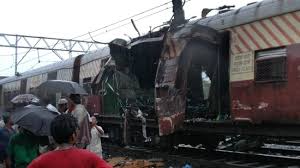‘Give us back last 20 years’: Son of Mumbai blasts accused, who died in jail 4 years before acquittal

Mohammed Iqbal, the son of the late Abdul Kareem Patel, one of the accused in the 2003 Mumbai blasts case, spoke out emotionally after a special POTA (Prevention of Terrorism Act) court delivered a verdict clearing his father’s name—four years after Kareem died behind bars.
The Mumbai blasts accused acquitted this week were among those charged under POTA in the high-profile blasts that rocked Mumbai in August 2003, killing over 50 people and injuring more than 250. Yet, after years of delay and prolonged trial proceedings, the court found no substantial evidence to convict several of the men.
Justice Too Late for the Dead
Abdul Kareem Patel was 42 when he was arrested in 2003. He spent 16 years in jail without bail and died in 2019 at the age of 58 due to health complications exacerbated by prison conditions. He never got to see the judgment that finally exonerated him.
Speaking outside the courtroom, Iqbal, now in his 30s, said:
“They branded him a terrorist. They ruined our lives. We lived in fear, in shame, and in poverty. And now they say he was innocent? Who will give us back the last 20 years?”
The court’s judgment observed that there was a “lack of direct evidence” linking Kareem to the conspiracy and actual blasts, and cited procedural lapses, unreliable witness testimonies, and contradictions in police claims.
The Human Cost of Miscarried Justice
For the Patel family, the ruling was a bitter victory. While they welcomed the acquittal, the damage—social, emotional, and economic—has been immense.
“Our relatives distanced themselves. I dropped out of school. My mother worked as a domestic help. And my father… he was innocent, yet he died behind bars,” Iqbal recounted tearfully.
Legal experts say this case underscores the grave issues with India’s anti-terrorism laws and the slow judicial process.
“The burden of proof under POTA was skewed. Many arrests were made on flimsy grounds. Once accused, a person lived under a cloud of suspicion for life,” said Advocate Irfan Ansari, a criminal lawyer who has represented several terror-accused cases.
Pattern of Acquittals, But No Compensation
This case is not unique. Over the years, Indian courts have acquitted dozens of terror-accused individuals after they spent decades behind bars. In most cases, no compensation or official apology is offered.
In 2016, five men acquitted in the 2002 Akshardham Temple attack after 11 years of incarceration also received no formal redressal. The pattern reflects a systemic failure in balancing national security with individual rights.
Activists are now demanding that the state create a legal mechanism to offer compensation in wrongful detention cases.
“We need a law that ensures accountability. Lives are being destroyed on mere suspicion, and the state walks away without consequence,” said Teesta Setalvad, a prominent human rights activist.
A Legal Black Hole: The Aftermath of POTA
Enacted in 2002, POTA was repealed in 2004 due to widespread criticism about its misuse. Yet, cases already filed under it have continued to crawl through the courts for years.
The 2003 Mumbai blasts case was one of the most high-profile trials under POTA. More than 100 people were accused, and a large number have now either been acquitted or had their charges reduced due to lack of evidence.
The trial was marked by allegations of custodial torture, forced confessions, and poor legal representation for many of the accused.
Families Speak Out: ‘Our Pain Was Invisible’
Families of other acquitted men echoed Iqbal’s grief. Farhana Shaikh, the daughter of another accused, said:
“My father was arrested when I was 8. I finished school and college while he was in jail. He came out a broken man, and now they say he was never guilty? Our pain was invisible to everyone.”
These families now plan to approach the Maharashtra government demanding compensation and a public acknowledgment of their ordeal.
Political Silence and Legal Apathy
Despite the severity of the court’s observations, there has been little reaction from political parties. Neither the state nor central government has issued a statement regarding the acquittals.
Legal commentators argue that silence from the establishment contributes to the erosion of public trust.
“Justice delayed is justice denied. In this case, justice was not just delayed—it was buried,” said Supreme Court lawyer Vrinda Grover.
Call for Reform: Accountability for Wrongful Arrests
Civil rights groups have renewed calls for systemic reforms, including:
- Mandatory fast-tracking of cases involving national security charges
- Independent oversight in arrest and interrogation processes
- Compensation law for wrongful imprisonment
- Psychological and social rehabilitation for acquitted individuals and their families
Iqbal and other affected family members are planning to file a Public Interest Litigation (PIL) demanding these changes.
Conclusion
The Mumbai blasts accused acquitted years after their arrest tell a chilling tale of how the justice system can both delay and deny dignity. For families like that of Abdul Kareem Patel, no court ruling can undo the stigma or return the lost decades.
Iqbal’s final words outside the court reverberated with pain:
“You say my father is not guilty. Fine. Now show me how we live with what you did to us. Justice came too late.”






